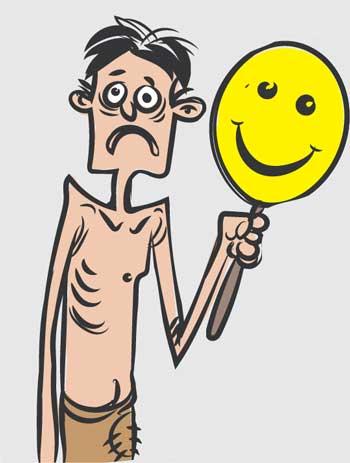14 Mar 2024 - {{hitsCtrl.values.hits}}
 Are the people of Sri Lanka happy? Most independent and non-party analysts would say a clear no. Millions of people are suffering from a lack of food, shelter, clothing, healthcare needs, education and other facilities. So it is clear that except for the politicians– most of whom make money illegally– and big business magnets, most of Sri Lanka’s people are unhappy.
Are the people of Sri Lanka happy? Most independent and non-party analysts would say a clear no. Millions of people are suffering from a lack of food, shelter, clothing, healthcare needs, education and other facilities. So it is clear that except for the politicians– most of whom make money illegally– and big business magnets, most of Sri Lanka’s people are unhappy.
Next week, the United Nations will mark the International Day of Happiness. In a statement, the world body said that happiness is a fundamental human goal. The UN General Assembly recognizes this goal and calls for a more inclusive, equitable and balanced approach to economic growth that promotes happiness and well-being of all people.
Governments and international organizations should invest in conditions that support happiness by upholding human rights and incorporating well-being and environmental dimensions into policy frameworks, such as the 17 Sustainable Development Goals. The effectiveness of governments in upholding peace and social order, as well as in the fields of taxation, legal institutions and delivery of public services, strongly correlates with average life satisfaction, the UN says.
The UN invites each person of any age, and every classroom, business and government to join in the celebration of the International Day of Happiness.
The UN General Assembly, in a resolution of July 12, 2012, proclaimed March 20 the International Day of Happiness, recognizing the relevance of happiness and well-being as universal goals and aspirations in the lives of human beings around the world and the importance of their recognition in public policy objectives. It also recognized the need for a more inclusive, equitable and balanced approach to economic growth that promotes sustainable development, poverty eradication, happiness and the well-being of all people.
The resolution was initiated by Bhutan, a country which recognized the value of national happiness over national income since the early 1970s and famously adopted the goal of Gross National Happiness over Gross National Product. It also hosted a High Level Meeting on “Happiness and Well-Being: Defining a New Economic Paradigm” during the sixty-sixth session of the General Assembly.
Furthermore, the UN also refers to the Happy School Project of the United Nations Educational Scientific and Cultural Organisation. The Happy Schools Project, which was introduced in 2014 in Bangkok, offers an alternative approach to improving learning experiences by prioritizing school happiness. By focusing on well-being, engagement, and sense of belonging at school, the Happy Schools Project helps foster a lifelong love of learning. In 2022, a guide and toolkit were developed. The Happy Schools Project is going global with its advocacy for prioritizing well-being and happiness in schools, with renewed focus on bettering learning experiences. This initiative encourages education systems to place happiness at the core of their education transformation journeys and to recognize it as a means to and a goal of quality education.
Today’s education systems are challenged by a twin crisis of equity and relevance, exacerbated by long-term underfunding, the COVID-19 pandemic, disruptive changes in technology, and in many places, natural disasters, conflict and the resulting displacement of communities. The outcomes of these challenges include widespread low and unequal learning achievement, declining student and teacher well-being, rising rates of out-of-school children, school violence, learner disengagement and school dropouts, heavy workloads for teachers and students, and teacher burnout and shortages.
Worldwide, education leaders at all levels – from schools to national governments – face the daunting task of deciding how best to address these hardships amidst rising pressures on the education sector to solve societal and political problems.
One of the world’s greatest statesmen Mahatma Gandhi has said that happiness is when what you think, what you say, and what you do are in harmony. Tibetan Buddhist leader Dalai Lama says, happiness is not something ready-made, which comes from your own actions. Jesus Christ says that when we are selfish and self-centred, we cannot be happy though we have a lot of money and more fame.
25 Nov 2024 24 minute ago
25 Nov 2024 42 minute ago
25 Nov 2024 2 hours ago
25 Nov 2024 2 hours ago
25 Nov 2024 2 hours ago